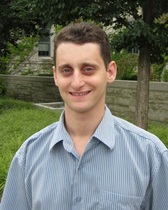DOE Reinvests in Northwestern's Quantum Science Research
September 13, 2024
Northwestern University’s Center for Molecular Quantum Transduction (CMQT) has received a new $14.5 million reinvestment from the U.S. Department of Energy (DOE), extending the center’s funding for another four years.

Physics and Astronomy Professor Nate Stern is one of the Thrust leaders for this center and highly involved in the center leadership.
Since its founding in August 2020, CMQT researchers made significant progress into understanding quantum transduction, the exchange of information between quantum systems. For example, CMQT researchers published more than 60 peer-reviewed studies on key issues related to quantum information science. The renewed funding will enable further contributions to the emerging field.
“We are energized by this award and eager to build our portfolio of unique contributions to the rapidly growing field of quantum science in the State of Illinois and around the world,” said Northwestern’s Michael R. Wasielewski, CMQT director. “CMQT research aims to achieve quantum-to-quantum transduction, an essential element of quantum information science.”
An expert in quantum science, Wasielewski is the Clare Hamilton Hall Professor of Chemistry at Northwestern’s Weinberg College of Arts and Sciences, director of the Institute for Quantum Information Research and Engineering and the outgoing founding executive director of the Paula M. Trienens Institute for Sustainability and Energy, a position he held since 2013.
CMQT joins 10 institutions to receive funding in this round of Energy Frontier Research Center (EFRC) awards. Funded by the DOE’s Office of Basic Energy Sciences, all EFRCs address grand scientific challenges at the forefront of fundamental energy science research. At Northwestern, the renewed funding is complemented by the University’s existing contributions to quantum information science.
“The future of quantum information science is extremely promising, offering the potential to revolutionize artificial intelligence, information technology, security, manufacturing, transportation and logistics,” said Eric Perreault, Northwestern’s vice president for research. “At the same time, quantum is here today, with Northwestern already making incredible contributions to the field.”
The award will help CMQT researchers build upon their recent breakthroughs in landmark coherence times and stabilities of molecular qubits and quantum materials as well as the ability to create hybrid qubits and resonant photonic architectures. An interdisciplinary collaboration among Northwestern chemists and physicists also developed a new method to create custom qubits by chemically synthesizing molecules to encode quantum information into their magnetic, or “spin,” states, an advance that allows atomistic control over structure.
As CMQT moves forward, its approach includes both ensemble-level studies to rapidly understand interactions and development of single-molecule methods to interface molecular quantum information science with other platforms. CMQT also will leverage cutting-edge physical measurement techniques with high spatial, temporal and spectral resolution to understand how to transition quantum-to-quantum transduction from the ensemble to the single molecule level.
Led by Northwestern, CMQT members represent 10 universities across the United States, including the University of California, Berkeley; University of California, San Diego; University of Chicago; Cornell University; University of Iowa; The Ohio State University; Princeton University; Rice University; Massachusetts Institute of Technology and University of Wisconsin-Madison.
Text from Northwestern Now article by Amanda Morris.
